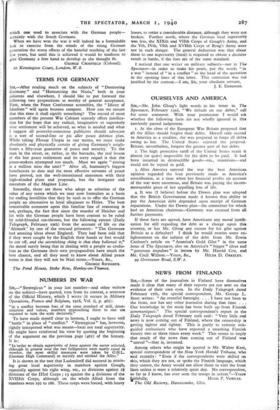NUMBERS IN WAR
SIR,—" Strategicus " in your last number—and other writers on the subject—have quoted, torn from its context, a sentence of the Official History, which I wrote (it occurs in Military Operations, France and Belgium, 1918, Vol. ii, p. 462): "in a conflict between foes of the same standard of skill, deter- mination and valour, numbers approaching three to one are required to turn the scale decisively."
To have made myself clear to laymen, I ought to have said " battle " in place of " conflict." " Strategicus " has, however, rightly interpreted what was meant—local not total superiority. He might have reinforced his view by quoting the beginning of the argument on the previous page (461) of the history. It is: "In order to obtain superiority of force against the sector selected, although in general total the two belligerents were nearly equal in number, the most skilful measures were taken by O.H.L. [German High Command] to mystify and mislead the Allies."
It is shown in the text that Ludendorff did succeed in attain- ing great local superiority in numbers against Gough, especially against his right wing, viz., to divisions against 21
divisions of the IIIrd Corps ; 13 against the 4 divisions of the XVIIIth Corps, although on the whole Allied front the
numbers were 192 to i86. These corps were forced, with heavy losses, to retire a considerable distance, although they were not broken. Further north, where the German local superiority was less, the XIXth and VIIth Corps of Gough's Army, and the Vth, IVth, VIth and XVIIth Corps of Byng's Army were not in such danger. The general deduction was that about three to one superiority (local) is required to obtain a decisive result in battle, if the foes are of the same standard.
I noticed that one writer on military subjects—not in The Spectator—in order to make his point, put the words " in a war " instead of " in a conflict " as the head of the quotation in the opening lines of this letter. This correction was not justified by the context.—I am, Sir, your obedient servant,
J. E. EDMONDS.














































 Previous page
Previous page